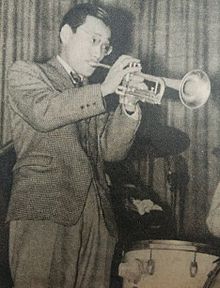Fumio Nanri
Fumio Nanri ( Japanese 南 里 文 雄 , Nanri Fumio ; * November 24, 1910 , † August 4, 1975 ) was a Japanese trumpeter of Dixieland Jazz . Nanri, who is considered to be one of the first jazz musicians in the country to gain notoriety outside of Japan, was reportedly referred to by Louis Armstrong as the " Satchmo of Japan ".
Live and act
Nanri took in 1934 in Tokyo a number of jazz standards for Columbia to as " Black and Blue ," " When the Saints Go Marching In ," " Dinah " and " St. James Infirmary ", he also acted as a member of the Columbia Japanese jazz band the Singer Midge Williams (" St. Louis Blues "). In 1961 he was a member of the all-stars band of the Japanese jazz magazine Swing Journal . In 1946 he founded the trad jazz band Hot-Peppers ( ホ ッ ト ペ ッ パ ー ズ , Hotto Peppāzu ), which he leads; their cast in 1948 included Hana Hajime , Toshiyuki Ichimura and Ichimura Toshiyuki . Although he went almost completely blind in 1953, he performed in August of that year with Louis Armstrong, who was in Japan. In 1971, in memory of the late Armstrong, he played with Bobby Hackett , Clark Terry and other musicians at a trumpet workshop .
The live album Fumio Nanri & New Orleans Rascals Jam Session at Red Arrow in Osaka was created under his own name in 1969 . 1971/72 recordings were made with the singer Maki Asakawa ( Blue Spirit Blues ). He recorded the album Fumio Nanri Recital in early 1973 for Victor; His last album 南 里 文 雄 ( Farewell ) was released posthumously in 1974 with Koichi Kawabe (trombone), Eiji Kitamura (clarinet), Shungo Sawada (guitar), Yuzuru Sera (piano), Masanaga Harada (bass) and Jimmy Takeuchi (drums) and standards like "My Blue Heaven", " Indiana ", " It's Only a Paper Moon " or " Sweet Georgia Brown " included. In the field of jazz he was involved in 11 recording sessions between 1934 and 1973.
In 1973 the Fumio Nanri Award , which is one of the most important annual jazz prizes in Japan, was named after him.
Web links
- Portrait (japanese)
- Fumio Nanri at Discogs (English)
Individual evidence
- ↑ a b c Brief portrait (How Japan Came to Love Jazz: 10 Pioneers of the Japanese Jazz Scene)
- ↑ In Nanris Band played Keitaro Shiga (tp), Tsunetami Fukuda (tb), Ryoichi Kawai (cl), Mitsuo Takahashi (as), Junichi Kawai (bj), Nobuo Ishida (kb), Yoichi Kimura (dr) and Jun Kobayashi ( wbd).
- ↑ With Yuichiro Nanri (trumpet), Kiyoshi Hasegawa (guitar, vocals), Hajime Hana (drums), Takuya Fujioka (vocals), Nobuo Hara (tenor saxophone, conductor)
- ↑ Tom Lord : The Jazz Discography (online, accessed July 1, 2017)
| personal data | |
|---|---|
| SURNAME | Nanri, Fumio |
| ALTERNATIVE NAMES | 南 里 文 雄 (Japanese) |
| BRIEF DESCRIPTION | Japanese jazz musician |
| DATE OF BIRTH | November 24, 1910 |
| DATE OF DEATH | 4th August 1975 |
